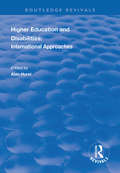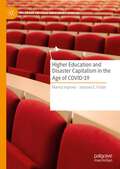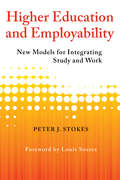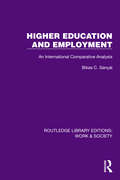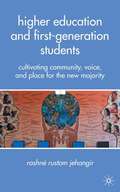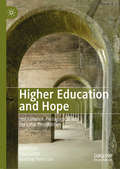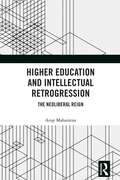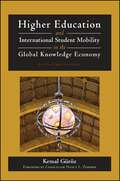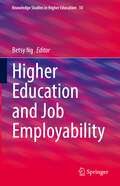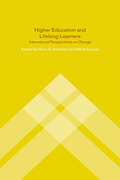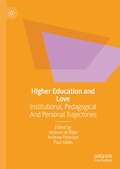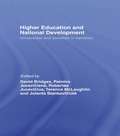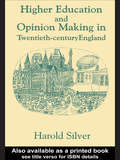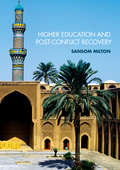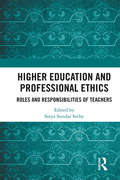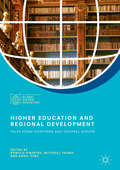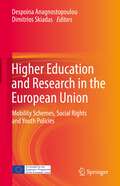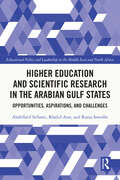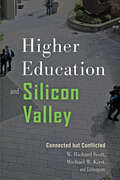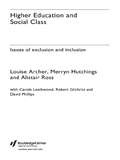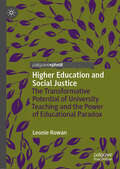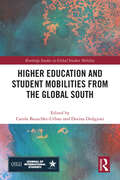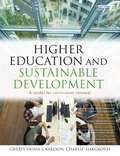- Table View
- List View
Higher Education and Disabilities: International Approaches
by Alan HurstThe subject of disabled students in universities has been overlooked in educational research. Building on the content of his first book "steps towards graduation" Alan Hurst has worked with colleagues from overseas to compile a collection of papers which explore aspects of policy and provision for this important student minority. The book contains accounts from Australia and North America as well as countries at different stages of policy development in Europe. The book should be of interest to staff working with students with disabilities in post-compulsory education since it describes strategies for developing policy, which could be transferable to other contexts. The book will be especially useful for those involved in promoting opportunities for study abroad. It will also be relevant to those engaged in researches in special education, comparative education and educational policy as well as in the growing area of disability studies.
Higher Education and Disabilities: International Approaches (Routledge Revivals)
by Alan HurstFirst published in 1998, this volume compares disability services and strategies along with students with disabilities across various countries around the world. Its publication followed a series of conferences held at different international locations. These papers have been brought together with the aim to better inform our understanding of approaches to disabled students and their experiences. Focusing on topics such as the Australian Disability Discrimination Act (1992), disability policy and supporting students with disabilities in higher education, this volume will be of use to students, lecturers, researchers and policymakers, whether able-bodied, neurotypical or disabled.
Higher Education and Disaster Capitalism in the Age of COVID-19 (Palgrave Critical University Studies)
by Marina Vujnovic Johanna E. FosterThis book reveals the layered effects of the corporatization of higher education, situated within the phenomenon of disaster capitalism. The authors argue that higher education administrators have seized on the Covid-19 pandemic as an opportunity to advance a corporate higher education agenda consistent with the principles of disaster capitalism. This crisis deeply impacts what and how students in the United States learn, who gets to learn, and the very mission of the academy. Chapters also address neoliberalism as a policy statement that has reshaped and continues to shape higher education in the United States and in much of Western societies.
Higher Education and Employability: New Models for Integrating Study and Work
by Peter J. Stokes Louis SoaresHigher Education and Employability makes a crucial contribution to the current reassessment of higher education in the United States by focusing on how colleges and universities can collaborate with businesses in order to serve the educational and professional interests of their students. Drawing on his extensive experience with universities and the business world, Peter J. Stokes argues that the need for closer alignment between the two sectors has never been more critical—and that the opportunities for partnership have never been greater. This book includes a series of trenchant case studies of particular universities that have developed ambitious collaborative programs—New York University, Northeastern University, and the Georgia Institute of Technology. Incisive and practical, this book surveys the full range of current partnerships between businesses and higher education and points to opportunities that will best serve students now and in the future.
Higher Education and Employability: New Models for Integrating Study and Work
by Peter J. Stokes2016 Phillip E. Frandson Award for Literature in the Field of Professional, Continuing, and/or Online Education, University Professional and Continuing Education Association (UPCEA)Higher Education and Employability makes a crucial contribution to the current reassessment of higher education in the United States by focusing on how colleges and universities can collaborate with businesses in order to serve the educational and professional interests of their students. Drawing on his extensive experience with universities and the business world, Peter J. Stokes argues that the need for closer alignment between the two sectors has never been more critical—and that the opportunities for partnership have never been greater. This book includes a series of trenchant case studies of particular universities that have developed ambitious collaborative programs—New York University, Northeastern University, and the Georgia Institute of Technology. Incisive and practical, this book surveys the full range of current partnerships between businesses and higher education and points to opportunities that will best serve students now and in the future.
Higher Education and Employment: An International Comparative Analysis (Routledge Library Editions: Work & Society)
by Bikas C. SanyalOriginally published in 1987, this book focusses on the relationship between higher education and employment and is based on 21 national case studies. The countries discussed are Bangladesh, Benin, Botswana, Egypt, Germany, Malaysia, Pakistan, People's Democratic Republic of Yemen, Philippines, Poland, Sri Lanka, Sudan, Tanzania, the former Union of Soviet Socialist Republics, Zambia, the State of West Bengal (India), Mali, Nepal, France, Indonesia and Peru. It is a unique collection of information, analyses and results which provide the basis for methodological lessons. The synthesis of the case studies has particular relevance as the unemployment or underemployment of higher-education graduates has become a universal issue, challenging all countries whether ‘developing’ or ‘developed’ and irrespective of their political ideology. Now, just as at the time of original publication, the effects of economic stagnation on the one hand, and an unchecked expansion of higher education on the other, are at the centre of the problem. The materials collected in the course of these studies provide a comprehensive data base which allows for some broad conclusions that are generally applicable to the higher-education planning process. The book identifies the determinants of demand for higher education and analyses the transition from higher education to work, as well as the actual mechanisms of the employment system during the latter part of the 20th Century.
Higher Education and First-Generation Students
by Rashné Rustom JehangirOffers readers a rich understanding of the experience of students who are first in their family to attend college. This book is a theoretically informed study of the lived experience of FG students and draws on their voices to demonstrate how their insights interface with what we, as educators, think we know about them.
Higher Education and Hope: Institutional, Pedagogical And Personal Possibilities
by Andrew Peterson Paul GibbsAround the world, the landscape of Higher Education is increasingly shaped by discourses of employability, rankings, and student satisfaction. Under these conditions, the role of universities in preparing students for all facets of life, and to contribute to the public good, is reshaped in significant ways: ways which are often negative and pessimistic. This book raises important and pressing questions about the nature and role of universities as formative educational institutions, drawing together contributors from both Western and non-Western perspectives. While the editors and contributors critique the current situation, the chapters evince a more humane and compassionate framing of the work of and in universities, based on positive and valued relationships and notions of the good. Drawing together a wide range of theoretical and conceptual frameworks to illuminate the issues discussed, this volume changes the debate to one of hopefulness and inspiration about the role of higher education for the public good: ultimately looking towards a potentially exciting and rewarding future through which humanity and the planet can flourish.
Higher Education and Intellectual Retrogression: The Neoliberal Reign
by Arup MaharatnaThis monograph critically analyses the historical evolution of ideas, perceptions and principles on higher education and unravels a few of its interlinked aspects – content, quality, standard, massification, privatization and commercialization. It presents both original and penetrative critique of neoliberal ideas and policies reigning higher education since World War II. The volume argues that with the proliferation of ‘academic capitalism’ the academic quality of higher education has been inevitably compromised and it has thereby heralded a comprehensive ‘intellectual retrogression’. The book offers a meticulous evaluation of global research reflecting on impeccable evidence of decline in academic learning – in its effort, quality, standards and overall intellectual level and rigour. Finally, it illuminates why it is dangerous to continue clinging ideationally to neoliberal reign in education and thereby evading or effacing some of the lasting and universal wisdoms and precepts of the educational reign preceding neoliberal marketoriented predominancy. The book will be of interest to students, teachers and researchers of education, higher education, sociology of education, economics and politics of education. It will also be useful for academicians, higher education administration, policymakers, schoolteachers and those interested in debates and issues around higher education.
Higher Education and International Student Mobility in the Global Knowledge Economy: Revised and Updated Second Edition
by Kemal GuruzPraise for the First Edition:"Higher education has exploded globally, and Gürüz's excellent, timely study is as useful a guidebook as one will find to this new (even revolutionary) world. . . [A] major contribution and starting point for an important conversation." Choice"Gürüz's book is a powerful and remarkably comprehensive work dealing with a wide array of interconnected topics and complex data relating to globalization and international student mobility. . . . Higher Education and International Student Mobility in the Global Knowledge Economy is a wonderful read on many levels and clearly represents decades of careful data analysis and synthesis." International Review of EducationStudents and scholars leaving their homes in search of education and knowledge is not a new phenomenon. An indispensable resource for understanding the international mobility of students, this book reveals how the global mobility of such students, scholars, programs, and institutions of higher education have evolved over time. Kemal Gürüz explores the contributions that the international mobility of students has made to civilization, scientific, and technological progress, and the ways in which it is occurring in today's global economy.The second edition of this widely praise study is completely revised and updated, tracing international mobility in higher education through the first decade of the twenty-first century.Kemal Gürüz is Former President of the Council of Higher Education of the Republic of Turkey and retired Professor of Chemical Engineering at the Middle East Technical University. In 2006, he was the first recipient of the Chancellor John W. Ryan Fellowship in International Education at the State University of New York.
Higher Education and Job Employability (Knowledge Studies in Higher Education #10)
by Betsy NgThis book presents the most comprehensive discussion of emerging trends in higher education in the Asia Pacific, ranging from graduate attributes to integrated workplace learning, with an in-depth focus on work readiness, employability and career development. It draws on the relationship between graduate attributes and employability, as well as vocational training or internship programs. It offers theoretical and empirical analyses that institutions, decision-makers or academics can work on together to enhance job employability. This volume will also include issues such as development of emerging and employability skills, as well as directions for the changing nature in real-world settings. The book consists of contributions from experienced international authors, offering detailed insights for those who want a timely understanding of the latest trends in higher education.
Higher Education and Lifelong Learning: International Perspectives on Change
by Hans G. Schuetze Maria SloweyResponding to the emerging needs of lifelong learners arguably represents one of the most fundamental challenges facing higher education systems of the countries of the developing world. At the start of the new century the concept of Lifelong Learning may indeed be counted as one of the the key organising concepts underlying public policy in many countries. The interpretation of the concept, however, remains highly contested.This timely book throws new light on the dramatic changes taking place in higher education through an exploration of the participation of "non-traditional" students in ten countries. Among others, the following areas are explored:* the complex reality behind the statistics on participation in higher education in five European countries (Austria, Germany, Ireland, Sweden and the United Kingdom), North America, Japan, Australia and New Zealand* contrasting perceptions of lifelong learning* changing patterns of participation by adults in higher education* national and institutional policies and innovations to accommodate non-traditional students and new forms of study * conclusions for policy, practice and researchHigher Education for Lifelong Learners will be of interest to academics, researchers and students involved with higher education, lifelong learning, and comparative education as well as policy makers, educational managers and administrators. The contributions reveal a remarkable transformation in the student body and in the way learners pursue their studies, highlighting the international impact of increasing marketisation and differentiation on the nature of the higher education accessible to potential lifelong learners.
Higher Education and Love: Institutional, Pedagogical and Personal Trajectories
by Andrew Peterson Paul Gibbs Victoria De RijkeThis book explicitly unites the concepts of higher education and love to examine how these concepts are mutually compatible. As the world of higher education moves towards the metrics of value, and the worth of knowledge becomes more valued in its use rather than its discovery, a crisis brews. If higher education is to contribute to the wellbeing of the self and of others, then the institution needs to be radically reviewed to see if, and how, love contributes to higher education within and beyond its walls. This book addresses the core question of what would the university might be like, today and into the future, if the timeless notion of love was the basis of its educative process, notwithstanding the material artefacts the university helps to create, but also as a way of framing approaches to higher education.
Higher Education and National Development: Universities and Societies in Transition
by David Bridges Palmira Jucevičienė Robertas Jucevičius Terence McLaughlin Jolanta StankevičiūtėUniversities and societies around the world are involved in significant transition. Universities are now invited to expand their central aims and purposes in order to embrace a role in relation to the development of the societies in which they are located. This change of focus has major implications for curricula, modes of teaching and the student body. International contributors to this wideranging text discuss different aspects of the phenomenon of globalisation in relation to higher education, but also in relation to moves by nation states to devolve government to regional and subregional bodies and the implications this has for educational systems.
Higher Education and Policy-making in Twentieth-century England (Woburn Education Series)
by Harold SilverThis book explores the changing patterns of higher education in England in the twentieth century, the types of institutions and the emergence of a 'system' of education. At the same time it traces the relationship between the writer-advocates of higher education and the changing world of higher education and its contexts. There is therefore an interrelated story of higher education, the writers, their messages, their backgrounds and ideologies, the audiences they intend to address, and the impacts of the state and other external forces.It is likely to appeal to higher education academics and administrators, politicians and other policy makers, staff and students on higher degree and professional programmes. It should be read by anyone who cares about English Universities and their future.
Higher Education and Post-Conflict Recovery
by Sansom MiltonThis book offers a critical review of higher education and post-conflict recovery. It provides the first systematic study with a global scope that investigates the role of higher education systems in conflict-affected contexts. The first part of the book analyses the long-standing neglect of higher education in post-conflict recovery, the impact that conflict can have on the sector, and efforts to rebuild and reform higher education systems affected by violent conflict. The second part of the book considers the positive and negative contributions that higher education can make to a range of areas of recovery including humanitarian action, forced displacement, post-conflict reconstruction, statebuilding, and peacebuilding. With its reasoned defence of the importance of higher education for post-conflict recovery, the book will appeal to researchers, university students, and humanitarian and development policy-makers and practitioners.
Higher Education and Professional Ethics: Roles and Responsibilities of Teachers
by Satya Sundar SethyThis book discusses the significance, relevance, and usefulness of professional ethics in the context of higher education. It highlights the pivotal role of professional ethics in offering teachers a better understanding of their responsibilities, duties, rights, and institutional obligations as they work to provide quality education. The volume investigates the connection between the adoption of professional ethics by individual faculty members in higher education and the development of work cultures in higher educational institutions. It explores the requisite modifications of the Teachers’ Code of Ethics in relation to the usage of Information and Communication Technologies (ICTs) in teaching–learning platforms. While examining the validity, reliability, and application of professional ethics in the higher education sector, the book also illustrates the application of codes of ethics to resolve conflicting interests and commitments. This book will be useful to scholars and researchers in higher education, the philosophy of education, applied ethics, public policy, and the social sciences.
Higher Education and Regional Development: Tales from Northern and Central Europe (Palgrave Studies in Global Higher Education)
by Rómulo Pinheiro Mitchell Young Karel ŠimaThis book analyses the role of universities as critical actors in the socio-economic development of peripheral regions in Norway and the Czech Republic. Examining the ambiguities of the traditional mission of a university in comparison to contemporary demands, the editors and contributors move past single-case analyses to adopt an integrated conceptual and analytical framework. The authors question whether universities can indeed ‘fix’ the conditions of any region they operate in, as is a common assumption, by examining peripheral regions, many of which have been devastated by natural or man-made disasters. Simultaneously acknowledging the complexities at the heart of both higher education institutions and regions, this book brings together a set of critical contributions that shed light on how universities can fulfil their role in peripheral regions rather than knowledge-intensive cities and towns. This uniquely researched book will be of interest to students and scholars of higher education, universities and communities, and education policy.
Higher Education and Research in the European Union: Mobility Schemes, Social Rights and Youth Policies
by Despoina Anagnostopoulou Dimitrios SkiadasThis interdisciplinary book consists of three parts which examine the European Union policies on research and innovation, education and life-long learning, as well as the European Union Pillar on social rights and youth policies. In the first part, high-level experts analyze the European Research Area and its current enhancement, with emphasis on mobility and employability of researchers, especially in times of crises.In the second part, the governance architecture of the European Education Area(s) is explored and the new objectives of the Bologna Process, as well as the EU institutional framework of the recognition of skills and qualifications, are analyzed. Life-long learning is also important for the individual development of human capital especially for socially vulnerable people who could also benefit from literacy policies and skills development. The second part concludes with the evaluation of the EU education and training policy based on social indicators in the framework of the EU 2020 Strategy.In the third part, the book turns to Social Europe and the balancing between ordo-liberalism and ordo-socialism. It examines the EU Pillar of Social Rights and its impact on youth policies. It analyzes the EU youth policies e.g. on youth credit and their interaction with young people’s employment and education possibilities, with emphasis on the young people "not in education, employment or training" (NEETs).
Higher Education and Scientific Research in the Arabian Gulf States: Opportunities, Aspirations, and Challenges (Educational Policy and Leadership in the Middle East and North Africa)
by Khalid Arar Abdellatif Sellami Rania SawalhiThis book takes a closer look at the relation between current issues and trends in higher education and scientific research in the Arab World and in the Gulf Cooperation Council (GCC) states of Qatar and United Arab Emirates (UAE). This thoroughly researched text traces the development of higher education in the GCC area as it continues to be positioned in an intersection of international and local factors. The text further articulates the pivotal political and cultural influences that act as real and perceived barriers towards the advancement of key fields. The chapters analyze the current policy trends, structures, and coping alternatives in addressing higher education challenges, whilst also providing comparative first-hand texts with the other Arab states in the region. By drawing focus on the GCC area, the text identifies the crucial factors that hamper learning and research performance. The book serves as an invaluable discussion on the implications for policy makers and HEIs in relation to the eponymous regions and other Arab states in the GCC area. Enhancing understanding of the scope, scale, and complexity of higher education and scientific research in the GCC area, the book will be of interest to academics, researchers, and post-graduate students in the fields of educational policy, comparative and international education and higher education.
Higher Education and Silicon Valley: Connected but Conflicted
by W. Richard Scott Michael W. KirstA data-rich study of the difficult partnerships between the colleges, universities, and businesses of Silicon Valley.Universities and colleges often operate between two worlds: higher education and economic systems. With a mission rooted in research, teaching, and public service, institutions of higher learning are also economic drivers in their regions, under increasing pressure to provide skilled workers to local companies. It is impossible to understand how current developments are affecting colleges without attending to the changes in both the higher education system and in the economic communities in which they exist.W. Richard Scott, Michael W. Kirst, and colleagues focus on the changing relations between colleges and companies in one vibrant economic region: the San Francisco Bay Area. Colleges and tech companies, they argue, have a common interest in knowledge generation and human capital, but they operate in social worlds that substantially differ, making them uneasy partners. Colleges are a part of a long tradition that stresses the importance of precedent, academic values, and liberal education. High-tech companies, by contrast, value innovation and know-how, and they operate under conditions that reward rapid response to changing opportunities. The economy is changing faster than the postsecondary education system.Drawing on quantitative and historical data from 1970 to 2012 as well as 14 case studies of colleges, this book describes a rich and often tense relationship between higher education and the tech industry. It focuses on the ways in which various types of colleges have endeavored—and often failed—to meet the demands of a vibrant economy and concludes with a discussion of current policy recommendations, suggestions for improvements and reforms at the state level, and a proposal to develop a regional body to better align educational and economic development.
Higher Education and Social Class: Issues of Exclusion and Inclusion
by Alistair Ross Louise Archer Merryn HutchingsWorking class groups have historically been excluded from participation in higher education. Past decades have seen an expansion of the system towards a more inclusive higher education, but participation among people from working class groups has remained persistently low. Is higher education unattractive for these groups or are the institutions acting to exclude them?This thought-provoking and revealing book examines the many factors and reasons why working class groups are under-represented in higher education. In particular, the book addresses issues around differential access to information about university, the value of higher education to working class groups, the costs of participating and the propensity to participate. Issues of gender and ethnicity are also explored and questions are raised for those who are currently involved in 'widening participation' projects and initiatives. A unique feature of the book is that its findings are drawn from an innovative study where the views of both working class participants and non-participants in higher education were explored.This book will be of interest to students of social policy, educational studies and sociology of education at undergraduate and postgraduate level. Academics, researchers and policy makers nationally and internationally will also find it valuable.
Higher Education and Social Justice: The Transformative Potential of University Teaching and the Power of Educational Paradox
by Leonie RowanThis book demonstrates how the pedagogical decision making of university academics can be shaped by engagement with an educational philosophy known as “relationship-centred education”. Beginning with critical analysis of concepts such as student engagement, student satisfaction, and student-centred learning, the author goes on to investigate how literature relating to social justice challenges educators to consider these terms in particular ways. From this basis, the book explores the factors featuring in inclusive, respectful, diverse and student-centred environments. In analysing these factors, the author illuminates the perspectives of university teachers who struggle with the unique challenges of working in the academy; including an increasingly broad set of employment demands and narrower criteria for determining ‘impact’, all while retaining focus on the transformative potential of higher education. This book will be of interest to students and scholars of transformative learning, as well as social justice within higher education.
Higher Education and Student Mobilities from the Global South (Routledge Studies in Global Student Mobility)
by Carola Bauschke-Urban Dorina DedgjoniThis interdisciplinary collection explores student mobilities from the Global South, focusing on how class, ethnicity, and gender influence decisions, experiences, and outcomes in studying abroad.Featuring post- colonial perspectives from Brazil, Indonesia, Ghana, and India, the collection highlights the unique challenges and opportunities faced by these students. It includes personal narratives that add a qualitative dimension, illustrating the individual agency and resilience of international students. The role of educational institutions and policies in shaping mobility is also addressed, including a discussion of how universities and governments create opportunities or barriers. Overall, this collection provides valuable insights into the interplay of class, ethnicity, and gender in shaping educational trajectories from the Global South.By centering student perspectives, it examines national, transnational, and institutional factors that either promote or inhibit mobility. It will be of interest to students, lecturers, researchers, ministries, and NGOs working on higher education research and migration studies.
Higher Education and Sustainable Development: A model for curriculum renewal
by Cheryl Desha Karlson 'Charlie' HargrovesResponding to the global and unprecedented challenge of capacity building for twenty-first century life, this book is a practical guide for tertiary education institutions to quickly and effectively renew the curriculum towards education for sustainable development. The book begins by exploring why curriculum change has been so slow. It then describes a model for rapid curriculum renewal, highlighting the important roles of setting timeframes, formal and informal leadership, and key components and action strategies. The second part of the book provides detailed coverage of six core elements that have been trialled and peer reviewed by institutions around the world: raising awareness among staff and students mapping graduate attributes auditing the curriculum developing niche degrees, flagship courses and fully integrated programs engaging and catalysing community and student markets integrating curriculum with green campus operations. With input from more than seventy academics and grounded in engineering education experiences, this book will provide academic staff with tools and insights to rapidly align program offerings with the needs of present and future generations of students.

